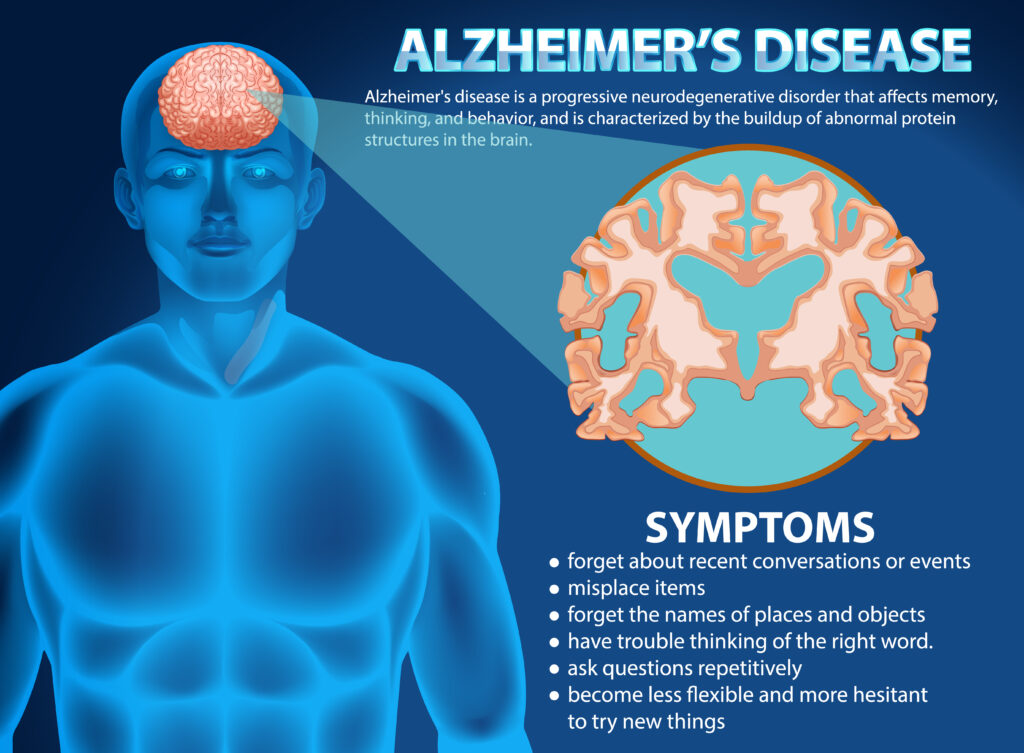Protect Your Brain Health: Daily Habits for Managing Alzheimer’s and Dementia
How often do we pause and think about our brain health? We focus on work, life, and goals, but do we think about the organ that supports us through it all?
Your brain has to support you in the next 20 to 30 years, and the seeds you plant today will determine its health tomorrow.
While Alzheimer’s and dementia are on the rise, prevention is always better than condition management, especially when it comes to cognitive decline. There may not be a cure, but there’s always hope for prevention and if you are diagnosed with it, to improve the quality of life.
Three simple steps—getting enough deep sleep, nourishing the brain with clean food, and moving regularly—can make all the difference in slowing down cognitive decline. You have the power to take action today.
Understanding Alzheimer’s and Dementia
Our brain is a network of over 100 billion neurons, connected by trillions of synaptic bridges. These connections are vital for everything we do—memory, learning, movement, and cognitive performance. The healthier and more active these connections, the better our brain functions.

Your brain is constantly looking to connect, and the more efficient those connections, the healthier your brain is.
Let’s talk about why this is important.
Alzheimer’s and dementia are neurodegenerative conditions that impact those connections. They affect memory, daily activities, and even how we recognize loved ones. This happens because synaptic connections—those little bridges between neurons—begin to weaken.
Right now, many of us are living life to the fullest—pursuing our goals, ambitions, and dreams—but we may not be thinking about how our health will support us 20 or 30 years from now.
The truth is, while we enjoy life, it’s important to remember that our brains will need to keep supporting us in the future, and we can start planting the seeds of health today.
What many don’t realize is that the decline starts long before symptoms appear.
Patients in various stages of Alzheimer’s and dementia struggle with doing things for themselves. This could be something like taking their medicines, changing clothes, or opening a door. They also experience mood fluctuations and emotional turbulence as a result of these systems.
Moreover, caring for patients with degenerative disorders can require several aspects, like a caretaker and a nurse, as they require personalized assistance and monitoring.
However, there is HOPE.
What if a few changes in lifestyle habits, our loved ones could live a better quality of life? A cure isn’t on the table, but slowing disease progression and condition management are achievable with the right care.
Or better yet, what if there was a way to prevent the onset of these diseases?
I always believe in the principle of prevention being better than a cure.
Poor lifestyle choices—whether it’s inadequate sleep, poor nutrition, or lack of movement—can lead the brain from connection to protection mode. And once the brain is in protection mode, it’s harder to reverse the damage.

By understanding this now, we have the opportunity to take care of our brain long before it shows signs of decline.
Disclaimer: Always make an informed choice. Keep your healthcare provider in the loop before trying anything new, especially if you are going through a medical condition or are on medications.
From Protection to Connection: Enhancing Brain Performance
Our brains are designed for performance, but modern lifestyle choices often push them into protection mode. When we’re sleep-deprived, stressed, and consuming unhealthy food, our brain’s natural ability to connect and perform takes a hit.
“Right now, many of us have moved from connection to protection. Instead of thriving, the brain is just trying to survive.”
- Luke Coutinho
This shift happens when poor lifestyle habits cause inflammation and stress, making the brain work harder just to protect itself. Whether it’s chronic or uncontrolled stress, poor nutrition, or lack of movement, the brain starts to slow down, and what many people mistake for aging is actually the result of this protective state.
To move from protection to connection, we need to address these habits. Deep sleep, good nutrition, and regular movement can help the brain stop merely defending itself and start performing optimally again.
Today, most of our brains are stuck in protection mode because of our poor lifestyle.
By making these lifestyle shifts, we allow the brain to function in its natural, high-performing state.
Let’s take a look at them in detail.
Foundational Lifestyle Habits for Cognitive Health
The brain thrives when we provide it with the right foundations. It’s not about complicated treatments; it’s about simple, everyday habits. Deep sleep, clean food, and movement—these are the basics that will keep your brain healthy and strong.
-
Deep Sleep: Sleep is the brain’s time to detox and recover. While you may be familiar with your body’s detox process during the day, your brain does its cleansing at night. Your brain cleanses itself while you sleep, flushing out toxins, including harmful proteins like amyloid, which can build up and lead to cognitive decline. Without deep, restorative sleep, toxins accumulate, affecting memory, learning, and overall brain function. That’s why I encourage all my clients to work on their quality of sleep—it’s a non-negotiable for good health.
- Fix your sleep and waking up time for at least 5 days a week, with a maximum of a 30-minute variation. This will help repair your circadian rhythm.
- Complete dinner at least three hours before bedtime. This will encourage your body to run its cleaning, repair, and rejuvenation functions better.
- Try to minimize social media and digital device consumption an hour before bed. This will ensure your body gears up for deep sleep, minus any distracting elements.
- Use blue light blockers, especially if you work late in the night to protect your health.
Work on calming your vagus nerve to activate the parasympathetic nervous system. This will put your body in rest and digest mode, promoting deeper sleep. -
Clean Nutrition: Everything we eat either fuels or inflames our brain. Processed foods, sugar, and toxins promote inflammation, pushing the brain into protection mode. Nutrient-dense, toxin-free foods reduce inflammation, allowing your brain to stay in connection mode, where it performs at its best.
- Focus on anti-inflammatory foods, healthy fats, clean protein, and fresh produce.
- Reduce the consumption of excess sugar and processed food, which weaken your cognitive function over time.
“Inflammation affects every single cell, including your brain. The cleaner your food, the more you protect those precious connections.”
– Luke Coutinho
- Movement & Exercise: Blood circulation is key to keeping your brain sharp. Regular exercise, whether it’s walking, strength training, or even gentle stretching, improves circulation, bringing oxygen and nutrients to your brain. Movement strengthens brain connections and promotes neuroplasticity, which helps you stay mentally agile as you age. Even if you’re limited in mobility, there are always ways to challenge your muscles and keep the blood flowing to your brain.
A Glance into The Gut-Brain Connection
The health of your gut plays a crucial role in the way your brain functions. The gut and brain communicate constantly through the gut-brain axis, a complex network that links your digestive system with your central nervous system.
If your gut health is compromised, it can lead to inflammation that affects your brain, impacting mood, memory, and cognitive function.
Improving your gut health can have a direct positive impact on your brain. Incorporate foods rich in fiber, probiotics, and prebiotics to support a healthy microbiome.
Avoid processed foods, excessive sugar, and artificial additives that can disrupt gut health.

Regularly consuming fermented foods along with plenty of fruits and vegetables, will help nourish your gut, which in turn keeps your brain functioning at its best.
The Role of Stress, Toxins, and Environment
Stress is one of the biggest enemies of the brain. When we’re constantly stressed, the brain shifts into protection mode, limiting its ability to connect and perform. Over time, this leads to mental and physical burnout.
If you find yourself always stressed, it’s time to ask – what’s causing this, and how can you take control? Meditation, breathwork, and even a simple walk outside can help calm the mind and body.
Toxins, whether from food, mold, or pollution, are also harming your brain. But you don’t have to control everything; just do your best. Clean up your nutrition by choosing whole, natural foods, and be mindful of your environment.
Check your home for mold, reduce your exposure to chemicals, and limit time spent in front of screens. Small steps, but they make a big difference.
Why Prevention Matters: Planting Seeds for the Future
Think about your future self. Cognitive decline doesn’t have to be a given—we have the power to prevent it with simple lifestyle changes.
Start now by prioritizing sleep, eating clean, managing stress, and moving more. It’s never too early or too late to make these changes, and every small step you take today will help protect your brain tomorrow.
Final Word: Proactive Steps to Protect Your Brain
The beautiful thing about your brain is that it’s never too late to start taking care of it. While there may be no cure for Alzheimer’s and dementia, the lifestyle choices we make today can slow their progression and dramatically improve the quality of life.
These steps – deep sleep, clean eating, and regular movement – are just as important for those already diagnosed with these conditions.
Apart from the three steps discussed today, integrating all the Six Pillars of Lifestyle – deep cellular nutrition, adequate movement, quality sleep, emotional wellness, reconnecting with spirit, and breath – is just as essential. Together, they can help prevent, slow disease progression, or improve a patient’s quality of life.
They won’t reverse the disease, but they can make life better, and more manageable, and improve overall well-being.
Start today. Every small change you make will protect your brain for years to come.
Ready to make your health a priority?
Start your journey with one positive action today.
Check out our Emotional Wellness Program.
Looking for personalized advice? Our experts are ready to help you thrive.
Reach out to Team Luke’s integrative health coaches!
Book a one-on-one with our team: 1800 102 0253 or write to us at consults@lukecoutinho.com.
|
From a pimple to cancer, our You Care Wellness Program helps you find a way Talk to our integrative team of experts today 18001020253 |










Leave a Reply